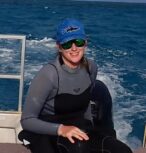DNA reveals the past and future of coral reefs
New DNA techniques are being used to understand how coral reacted to the end of the last ice age in order to better predict how they will cope with current changes to the climate. James Cook Univer

From 2005 to 2022, the main node of the ARC Centre of Excellence for Coral Reef Studies was headquartered at James Cook University in Townsville, Queensland (Australia)








Abstract:
Increased uptake of carbon dioxide from the atmosphere has caused the world’s ocean to become more acidic. Different marine habitats are known to have varying ranges of CO2 across multiple time scales. Coral reefs are known to have diurnal fluctuations, where the CO2 is high at night and low during the day. However, little is known about how these fluctuations differ across microhabitats within coral reefs. Further, though these fluctuations are naturally present they are often not included in predictions or future climate change conditions. Examining how more ecologically relevant future conditions affect coral reef fishes can provide more accurate information on how reef fishes will be affected in the future. In my PhD, I examined the current fluctuations of CO2 at different microhabitats within coral reefs. Further, I examined how incorporating ecologically relevant fluctuating treatments affects coral reef fishes and what mechanisms they use to maintain performance. I show that 1) current CO2 fluctuations differ more between reefs than between microhabitats within a reef; 2) some coral reef fishes can benefit in terms of swimming and energetics upon exposure to future fluctuating conditions; and 3) there is evidence for a mechanism fish use to maintain energy availability during exposure to elevated CO2.
Biography:
Originally from California, Kelly fell in love with the ocean from an early age. The ability to participate in marine research during her undergraduate degree cemented her desire to pursue this in the future. Following graduation, she worked on various islands performing research or teaching marine biology courses. While working on a field station in the Bahamas she met her M.Sc. advisor, Dr. Cory Suski, who encouraged her to join his lab at the University of Illinois. There she completed her M.Sc. examining the physiological effects of carbon dioxide on mussels. Kelly then joined CoralCoE in January 2017 to commence her PhD with Dr. Jodie Rummer and Prof. Philip Munday. Here she continued her research on how elevated carbon dioxide, specifically ocean acidification affects organisms. She is investigating how the exercise physiology of coral reef fishes is affected by stable and fluctuating carbon dioxide.
New DNA techniques are being used to understand how coral reacted to the end of the last ice age in order to better predict how they will cope with current changes to the climate. James Cook Univer
A new study on the effects of climate change in five tropical countries has found fisheries are in more trouble than agriculture, and poor people are in the most danger. Distinguished Profess
James Cook University researchers have found brightly coloured fish are becoming increasingly rare as coral declines, with the phenomenon likely to get worse in the future. Christopher Hemingson, a
Researchers working with stakeholders in the Great Barrier Reef region have come up with ideas on how groups responsible for looking after the reef can operate more effectively when the next bleaching
Abstract: As marine species adapt to climate change, their heat tolerance will likely be under strong selection. Individual variation in heat tolerance and its heritability underpin the potential fo
Abstract: The Reef Ecology Lab in KAUST’s Red Sea Research Center explores many aspects of movement ecology of marine organisms, ranging from adult migrations to intergenerational larval dispersal
Abstract: Macroalgal meadows are a prominent, yet often maligned component of the tropical seascape. Our work at Ningaloo reef in WA demonstrate that canopy forming macroalgae provide habitat for ad
Abstract: Sharks are generally perceived as strong and fearsome animals. With fossils dating back at least 420 million years, sharks are not only majestic top predators but they also outlived dinosa
Abstract: Connectivity plays a vital role in many ecosystems through its effects on fundamental ecological and evolutionary processes. Its consequences for populations and metapopulations have been
Abstract: Evolution of many eukaryotic organisms is affected by interactions with microbes. Microbial symbioses can ultimately reflect host’s diet, habitat range, and even body shape. However, how
Abstract: The past few years have seen unprecedented coral bleaching and mortality on the Great Barrier Reef (GBR) but the consequences of this on biodiversity are not yet known. This talk will expl